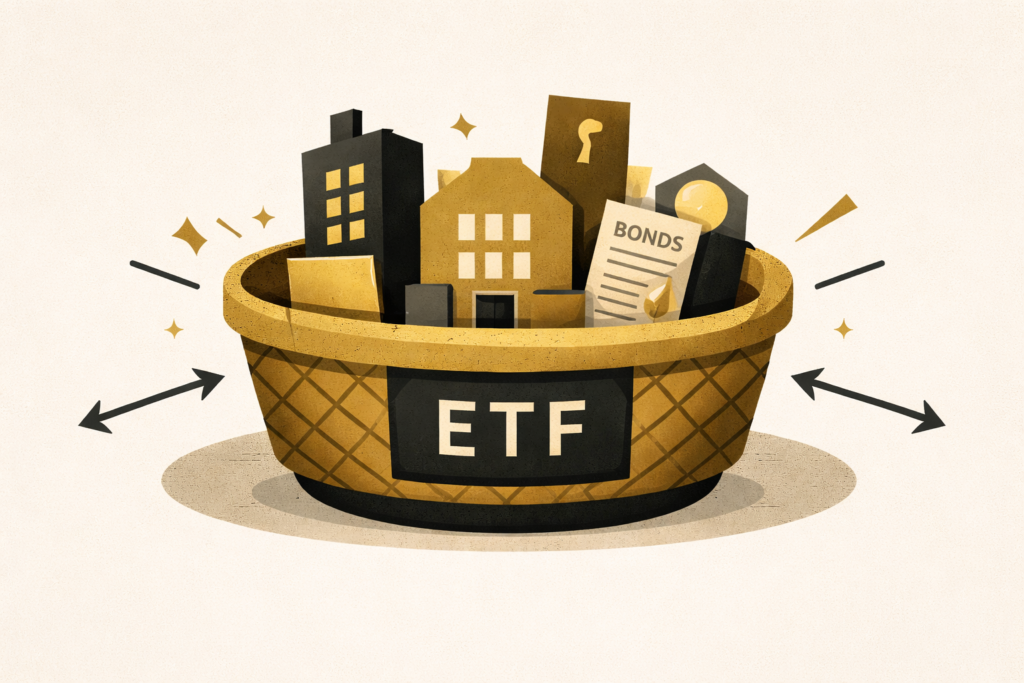How to Start an Emergency Fund (Beginner Guide)

Most people don’t fall into financial trouble because they’re reckless.They fall because life happens. A tire blows out on the highway.Hours get cut at work.A child gets sick.Rent goes up.The car refuses to start on Monday morning. And suddenly a small inconvenience becomes a financial emergency. Here’s the truth many households discover too late: The problem isn’t the emergency.The problem is being unprepared for it. That’s where an emergency fund changes everything. It turns panic into inconvenience.It turns stress into strategy.It gives you breathing room while everyone else is gasping for air. Let’s build yours step by step. What Is An Emergency Fund? An emergency fund is money set aside ONLY for unexpected, necessary expenses. Not vacations.Not shoes.Not a concert. We’re talking about: If it’s not urgent and unexpected, it doesn’t qualify. This money is your financial shock absorber. Why Beginners Must Start Here First Before investing.Before flipping houses.Before crypto.Before options. You need stability. Without a cushion, every surprise gets put on a credit card…and debt quietly becomes the thief of your future wealth. An emergency fund protects your:✔ Credit score✔ Investments✔ Peace of mind✔ Ability to make calm decisions No drama. No desperation. Step 1: Your First Goal → $1,000 Forget six months of expenses for now. Your first mission is simple:stack your first $1,000 as fast as possible. Why? Because most small emergencies fall under that number. And once you hit it, something powerful happens… You start moving different.You feel in control.You breathe easier. Confidence is built through wins. Step 2: Where Should You Keep It? Your emergency money should be: ✅ Safe✅ Easy to access✅ Separate from daily spending Good places include: Not under the mattress.Not invested in stocks.Not tied up where it can lose value. This is protection money, not growth money. Step 3: How Much Do You Eventually Need? After you reach $1,000, level up to: 👉 3–6 months of living expenses. If your monthly bills are $3,000, your target becomes: This is the number that protects families from layoffs, illness, or major life disruptions. Step 4: How To Build It Faster Most people think they can’t save. But usually, money is leaking quietly. Try this: Speed matters. The faster you build it, the faster stress leaves your life. Step 5: Automate Your Discipline Willpower fades. Systems win. Set up automatic transfers every payday — even if it’s only $25 or $50. You’re not trying to be impressive.You’re trying to be protected. Small deposits create big security over time. What Happens When You Finally Have One Something amazing changes. You stop fearing the mail.You stop dreading unknown numbers calling.You stop living on edge. You gain power. Because emergencies no longer control you. You control them. The BD&C Truth About Wealth Most people chase visible wealth. Nice cars.Designer clothes.Status. But real wealth often starts invisibly. In quiet accounts.In boring savings.In preparation. Because when storms hit, the prepared keep moving forward while others start over. If nobody ever taught you this, now you know. Start small.Stay consistent.Protect your household. Your future self will thank you. #EmergencyFund #RainyDayMoney #FinancialSecurity #BlackWealth #GenerationalWealth #MoneyBasics #WealthBuilding #BDandC Focus Keyphrase: how to start an emergency fundSlug: how-to-start-an-emergency-fundMeta Description: Learn how to start an emergency fund step by step. A beginner-friendly guide to building financial security, avoiding debt, and protecting your future. They never told us that peace of mind has a price — and it’s usually saved a little at a time. An emergency fund is more than money; it’s dignity, choice, and the power to say “we’ll be okay.” Start yours today, build it brick by brick, and watch how differently you walk through the world tomorrow. Read more and take control at Black Dollar & Culture.
When America Is in Debt, Ownership Is the Escape Plan

When a nation owes more than it owns, history begins to whisper. There is a moment in every empire’s life when the numbers stop being numbers and start becoming signals. Signals of strain. Signals of fragility. Signals that the ground beneath everyday people is slowly, quietly shifting. The screens still glow. The markets still open. Politicians still promise. But beneath the performance, the ledger is bleeding. And for families without ownership, that bleeding eventually reaches the doorstep. Because when governments drown in debt, they rarely sink alone. They inflate.They tax.They cut.They print.They postpone. But they do not protect you. This is the part they never teach in school, never advertise in campaign speeches, never explain during the evening news. Debt at the top changes life at the bottom. The question is never whether a reckoning comes. The question is who is prepared when it arrives. In times like these, there are always two kinds of people. The dependent and the positioned. The dependent wait. They hope the job holds. They pray prices settle. They assume retirement accounts will recover. They trust systems designed by people who already moved their money. The positioned study patterns. They understand that currency weakens when printing strengthens. They recognize that assets behave differently than wages. They know that ownership absorbs shock while dependency multiplies it. And they move early. Long before panic becomes policy. If you listen carefully, history has run this lesson before. When Rome stretched itself beyond sustainability, elites secured land while citizens received promises.When currencies faltered in Latin America, those with businesses survived while savers were erased.When inflation burned through the 1970s, hard assets outran paychecks. Different centuries.Same story. When the system is stressed, ownership becomes oxygen. Everything else becomes hope. But here is where this becomes personal. For generations, many families were kept from acquiring the very tools that provide insulation during unstable times. Access denied. Loans rejected. Districts redlined. Knowledge hidden behind walls of jargon. The result was predictable. When turbulence comes, those without assets feel it first and longest. So what do you do when the largest economy in the world keeps adding zeros to a bill nobody can realistically repay? You stop playing defense. You start building position. You convert fragile income into durable assets. You prioritize businesses that can raise prices with inflation.You learn how real estate transfers cost to tenants.You understand why equity in productive companies historically survives currency cycles.You build private systems of lending inside families.You turn consumers into shareholders. You become harder to shake. Because the uncomfortable truth is this: Governments respond to debt with policies.Owners respond to debt with strategy. And strategy travels through bloodlines. Some people will read headlines and freeze. Others will read balance sheets and prepare. This is not about fear. Fear paralyzes. This is about awareness. Awareness sharpens. A country carrying enormous debt will make decisions to maintain stability. Some of those decisions help markets. Some hurt workers. Some protect banks. Some dilute savers. But almost all reward ownership. That pattern is as old as finance itself. The people who understand it quietly rearrange their lives. They buy instead of rent.They invest instead of store cash.They create income streams instead of relying on one.They study policy the way farmers study weather. Because storms are inevitable. Preparation is optional. And once you see the pattern, you cannot unsee it. You begin to recognize why the wealthy rush into assets during uncertainty.Why institutions accumulate land.Why smart money prefers control over promises. They are not guessing. They are positioning. So the real conversation is not “Is America in debt?” The real conversation is, “Are we building protection faster than the system is building pressure?” That answer determines comfort or crisis for the next generation. Families who move early will look calm later. Families who wait will wonder what happened. And somewhere in the future, children will ask what decisions were made when the warning signs were visible. They will live inside the answer. History is generous with clues. It is ruthless with excuses. The debt may be national. But preparation is personal. Move accordingly. Focus Keyphrase: America in debt wealth strategyMeta Description: America’s rising national debt is a warning signal. Learn how families can protect themselves through ownership, assets, and generational wealth positioning.Slug: america-in-debt-wealth-strategy
The Safest Place to Keep Your Money During a Crisis

When a crisis hits — recession, banking panic, market crash, political chaos — the first instinct people have is to move fast. Pull money out. Hide cash. Chase whatever feels “safe” at the moment. That instinct has ruined more wealth than the crisis itself. The truth is uncomfortable, but powerful:There is no single “safe place” for money during a crisis. There is only a safe strategy. And the people who come out stronger aren’t the ones who panic — they’re the ones who prepared before the storm. Let’s walk through where money actually survives, grows, and stays accessible when systems get stressed. What “Safe” Really Means in a Crisis Before we talk locations, we need to define safety properly. During a crisis, “safe” does not mean: Safe means three things: Any place your money lives should satisfy at least two of the three. The strongest setups hit all three. 1. Insured High-Yield Cash (Your First Line of Defense) Despite the noise, cash is still king during uncertainty — when it’s parked correctly. Money held in FDIC-insured institutions remains one of the most reliable anchors during turmoil. Federal Deposit Insurance Corporation Why this works Where people mess up BD&C rule:Cash is not for growth — it’s for control. 2. U.S. Treasury Assets (Quiet, Boring, Powerful) When fear hits global markets, institutions don’t panic — they run to U.S. Treasuries. U.S. Department of the Treasury Treasury bills, notes, and money-market funds backed by Treasuries are considered some of the safest financial instruments in the world. Why this works What this isn’t This is storm shelter money — not party money. 3. Diversified Brokerage Accounts (Not Just Savings) Many people think crisis safety means “pull everything out.” Wealthy families do the opposite — they spread exposure. A well-structured brokerage account holding: creates controlled risk, not chaos. Why this works The danger isn’t investing during a crisis —it’s being forced to sell because you didn’t plan liquidity. 4. Hard Assets That Don’t Depend on Banks When trust in systems drops, tangible value matters. That includes: Gold isn’t magic — but it has survived: Why this works BD&C reminder:Hard assets protect wealth between generations — not just between paychecks. 5. The Most Overlooked “Safe Place”: Structure Here’s the part most people skip — and pay for later. The safest money isn’t just where it’s kept.It’s how it’s owned. Families that survive crises often use: Why? Because structure protects against: Money without structure is fragile — no matter where it sits. What Not to Do During a Crisis Let’s be clear. ❌ Don’t pull everything into physical cash❌ Don’t chase “guaranteed” returns❌ Don’t move money based on fear headlines❌ Don’t trust platforms you don’t understand Crises punish speed without strategy. The Real Answer No One Wants to Hear The safest place to keep your money during a crisis isn’t a bank, vault, or asset. It’s a system: That’s how wealth survives storms — and why some families quietly come out richer every time. ❤️ Support Independent Black Media Black Dollar & Culture is 100% reader-powered — no corporate sponsors, just truth, history, and the pursuit of generational wealth. Every article you read helps keep these lessons alive — lessons they never taught us, but always used. If this helped you think differently about safety, share it with someone who’s still being told to “just save more.”We don’t need fear.We need frameworks. Ownership over panic.Structure over noise.Strategy over luck. Focus Keyphrase: safest place to keep your money during a crisisSlug: safest-place-to-keep-your-money-during-a-crisisMeta Description: Learn where to safely keep your money during a financial crisis using a proven wealth strategy that prioritizes protection, liquidity, and long-term stability.
How to Invest in ETFs for Beginners (Step-by-Step)

Most people don’t avoid investing because they’re lazy.They avoid it because Wall Street made it sound complicated on purpose. Charts, jargon, talking heads, and fear — all designed to make everyday people feel like investing is something other people do. People with suits, connections, or insider knowledge. The truth is much simpler. Exchange-traded funds — ETFs — were created so regular people could build wealth without needing to guess the next hot stock, time the market perfectly, or sit in front of screens all day. If you understand the basics and stay consistent, ETFs can quietly do the heavy lifting for you. This guide walks you through exactly how to invest in ETFs as a beginner, step by step. 1. What an ETF Actually Is (Plain English) An ETF (exchange-traded fund) is a collection of investments bundled together into one product that trades on the stock market. Instead of buying one company at a time, an ETF lets you buy small pieces of many companies at once. For example: When you buy an ETF, you’re not betting on one company — you’re betting on entire markets. That’s why ETFs are beginner-friendly: they reduce risk through diversification. 2. Why ETFs Are Ideal for Beginners ETFs solve many of the problems that stop people from investing in the first place. Low CostMost ETFs charge extremely low fees compared to traditional mutual funds. Over time, lower fees mean more money stays in your pocket. Instant DiversificationOne purchase can spread your money across dozens, hundreds, or even thousands of assets. Simple to UnderstandYou don’t need to analyze earnings reports or follow daily stock news. FlexibleETFs can be bought and sold just like stocks during market hours. For beginners, ETFs remove complexity without sacrificing growth. 3. Before You Invest: Set the Foundation Before buying any ETF, handle three basics first. Emergency CushionHave some cash set aside. Even $500–$1,000 helps prevent you from pulling investments out at the wrong time. High-Interest DebtCredit cards charging 20% interest will erase investment gains faster than the market can grow them. Clear GoalKnow why you’re investing. Retirement. Long-term wealth. Financial freedom. The goal determines how aggressive or conservative you should be. Investing works best when it supports your life — not when it creates stress. 4. Choose the Right Type of Account You don’t buy ETFs directly — you buy them through an account. The two main options: Taxable Brokerage AccountBest for flexibility. You can invest, withdraw, and add money anytime. You’ll pay taxes on gains. Retirement Accounts (IRA / Roth IRA / 401k)Designed for long-term wealth. Tax advantages make these powerful if you don’t need the money soon. If you’re unsure, many beginners start with a taxable brokerage and later add retirement accounts as income grows. 5. Understand Risk Without Fear Risk isn’t the enemy — misunderstanding it is. Stocks go up and down. That’s normal. ETFs smooth this volatility by spreading risk across many assets. As a beginner, your biggest risk is not investing at all. General rule: Time reduces risk. Panic increases it. 6. Beginner-Friendly ETF Categories You don’t need dozens of ETFs. Most beginners do well starting with just a few types. Total Market ETFsTrack the entire U.S. stock market. Broad, simple, effective. S&P 500 ETFsFocus on America’s largest companies. Historically strong long-term growth. International ETFsExpose you to markets outside the U.S. for global diversification. Bond ETFsProvide stability and income. Useful as your portfolio grows. Dividend ETFsFocus on companies that pay consistent dividends, offering income alongside growth. You don’t need everything — just balance. 7. How Much Money Do You Need to Start? There is no minimum “wealth level” to begin. Many ETFs allow: What matters is consistency, not size. A small amount invested regularly beats a large amount invested once and forgotten. 8. The Power of Dollar-Cost Averaging Dollar-cost averaging means investing the same amount on a schedule — regardless of market conditions. This approach: Markets reward patience, not prediction. 9. How to Place Your First ETF Trade The mechanics are simple. Once purchased, the real work is doing nothing. Overtrading hurts beginners more than market downturns. 10. How Often Should You Check Your Investments? Not often. Checking daily leads to emotional reactions. Long-term investing doesn’t require constant attention. A healthy rhythm: Wealth grows quietly — not through constant movement. 11. Common Beginner Mistakes to Avoid Chasing hypeIf everyone is talking about it, the opportunity is often already priced in. OvercomplicatingMore ETFs doesn’t mean better results. Selling during downturnsMarket drops are normal. Selling locks in losses. Ignoring feesSmall percentages compound over time — in either direction. Simplicity wins. 12. The Long View: Why ETFs Build Quiet Wealth ETFs don’t promise overnight riches. They promise something better: ownership, participation, and compounding over time. Many everyday investors built wealth not by brilliance, but by staying invested through recessions, booms, crashes, and recoveries. The market rewarded discipline, not drama. This is how wealth is built when no one is watching. Final Thought: Start Small, Stay Consistent You don’t need permission to invest.You don’t need perfect timing.You don’t need expert predictions. You need a plan, patience, and consistency. ETFs allow everyday people to participate in systems once reserved for institutions. Used correctly, they become quiet tools of freedom — growing in the background while you live your life. The best time to start was yesterday.The second best time is today. Focus Keyphrase how to invest in ETFs for beginners Slug how-to-invest-in-etfs-for-beginners Meta Description Learn how to invest in ETFs for beginners with this step-by-step guide from Black Dollar & Culture. Understand ETFs, reduce risk, and build long-term wealth with confidence.
How Trusts Protect Assets From Lawsuits (And Why Most People Get It Wrong)

Most people believe that once assets are placed into a trust, they are automatically protected from lawsuits. That belief sounds comforting—but it’s often dangerously incomplete. Trusts can protect assets from lawsuits, but only when they are structured correctly, implemented early, and paired with the right legal principles. Otherwise, a trust may offer little more than a false sense of security. Asset protection is not about hiding money. It’s about changing ownership, limiting control, and placing legal distance between you and potential claims—before problems arise. To understand how trusts actually work in this context, we need to start with how lawsuits really take assets. When a lawsuit is filed and a judgment is entered, the opposing party is not looking for effort, intention, or fairness. They are looking for what you legally own and what you legally control. Bank accounts, real estate, investment accounts, business interests, and income streams are all evaluated through this lens. If an asset is considered yours—either because your name is on it or because you can freely access and control it—it may be reachable. This is where trusts come in, but not all trusts function the same way. A trust works by separating three roles: the person who creates the trust (the grantor), the person who manages the trust (the trustee), and the person who benefits from the trust (the beneficiary). Asset protection becomes possible when these roles are structured so that the grantor no longer has direct ownership or unrestricted control. In other words, protection comes from distance, not paperwork. One of the most common mistakes people make is assuming that a revocable living trust provides lawsuit protection. Revocable trusts are popular because they are flexible—you can change them, cancel them, and move assets in and out at will. However, from a lawsuit perspective, that flexibility is the problem. If you retain the power to revoke the trust or freely reclaim the assets, a court may still treat those assets as yours. In many cases, revocable trusts offer little to no protection from creditors. Irrevocable trusts operate differently. While “irrevocable” does not mean untouchable, it does mean that the grantor gives up certain rights and powers. That loss of control is precisely what can create asset protection. When structured properly, an irrevocable trust can place assets outside the grantor’s personal ownership, making it significantly more difficult for a creditor to reach them. Several mechanisms inside a trust determine whether it actually protects assets. One is legal ownership. If the trust, not the individual, owns the asset—and the individual cannot unilaterally reclaim it—that asset may be insulated from personal lawsuits. Another mechanism is the spendthrift provision, which can limit a beneficiary’s ability to transfer or pledge their interest and may restrict a creditor’s ability to force distributions. Trustee discretion also matters. When distributions are controlled by a trustee and not guaranteed on demand, creditors often face additional legal barriers. Timing is critical. Asset protection is strongest when trusts are established before there is any known claim, dispute, or legal threat. Moving assets into a trust after being sued—or after anticipating a lawsuit—can trigger fraudulent transfer laws. Courts have the power to reverse those transfers, effectively undoing the protection and potentially making the situation worse. This is why asset protection is about planning, not panic. Trusts are often used in combination with other protective tools. Real estate, for example, may be owned by an LLC to contain liability, with the ownership interest of that LLC held by a trust. Business interests may be structured so operational risk stays separate from personal wealth. Investment accounts can be titled in the name of a trust depending on the overall strategy. In each case, the trust is not the only line of defense—it is part of a layered system. The most common reason trusts fail in court is simple: too much control. When the same person is the grantor, trustee, and beneficiary—and can revoke the trust at any time—the legal separation collapses. Courts are not obligated to honor structures that exist in form but not in substance. Real protection usually requires real boundaries, sometimes including an independent trustee and clearly defined limits on access. From a BD&C perspective, trusts should be viewed as ownership tools, not magic shields. True protection comes from layering: reducing risk through smart behavior, transferring risk through insurance, containing risk through entities like LLCs, and then structuring ownership through trusts. Each layer reinforces the others. Trusts can protect assets from lawsuits—but only when they are built deliberately, early, and correctly. Wealth is not just about what you earn. It’s about what you can keep, control, and pass forward. Understanding how trusts really work is part of moving from income thinking to ownership thinking. This article is for educational purposes only and does not constitute legal advice. Asset protection strategies vary by jurisdiction, and qualified legal counsel should be consulted for individual circumstances. If you wait until risk shows up, it’s already too late. Asset protection only works before courts, creditors, or claims enter the picture. An Irrevocable Life Insurance Trust (ILIT) is one of the few tools that can legally remove life insurance from your estate and protect it from lawsuits — but only if it’s structured correctly. This guide breaks down exactly how ILITs work, when to set them up, and the mistakes that quietly expose families every day. Read the ILIT Guide now and secure the structure while you still control the outcome → Get Your Family Wealth Trust Blueprint Now Historically, the families who preserved wealth didn’t do it by reacting to threats—they built systems before threats ever appeared. Ownership structures, trusts, and layered protection weren’t accidents; they were deliberate moves. If you want to continue learning how real wealth is protected and transferred, explore more at Black Dollar & Culture and start building with intention, not urgency. Focus Keyphrase How trusts protect assets from lawsuits Meta Description Learn how trusts protect assets from lawsuits, why revocable trusts often fail, how irrevocable
How to Build a Business That Runs Without You

The Blueprint for True Freedom, Ownership, and Scale Most people say they want to own a business, but what they really end up building is a job with a logo. If the business collapses the moment you stop answering emails, posting content, or showing up every day, you don’t own a business—you own a dependency. True wealth comes from building systems that work whether you’re present or not. This is how the wealthy buy back their time, protect their energy, and scale beyond effort. Building a business that runs without you isn’t about laziness. It’s about design. It’s about removing yourself as the bottleneck and replacing hustle with structure, clarity, and automation. This guide breaks down exactly how to do that. 1. Start With the End in Mind (Owner vs Operator Thinking) The first shift is mental. You must decide early whether you’re building: An operator asks: What do I need to do today?An owner asks: What system needs to exist so this doesn’t require me? Every task you do manually today should be viewed as temporary. If you don’t design your business with replacement in mind, you’ll trap yourself inside it. Ask yourself: Those answers reveal exactly what must be systemized. 2. Choose a Business Model That Can Actually Scale Not every business is meant to run without you. Some models are naturally scalable, others fight you at every step. High-leverage models include: Low-leverage models include: If your income depends on your physical presence or constant customization, freedom will always be limited. The goal is repeatability, not perfection. 3. Document Everything You Do (Before You Delegate Anything) Most people try to hire help too early and fail because they never defined the work. Before you outsource or automate, you must document your processes: This can be as simple as: If someone can’t follow instructions to replace you, the system—not the worker—is the problem. 4. Turn Repetition Into Automation Anything repetitive should be automated before it’s delegated. Examples: Automation removes human error and emotional burnout. It also makes your business more valuable because systems don’t quit. Key areas to automate first: 5. Build a Team Around Roles, Not People A business that runs without you is built on roles, not personalities. Instead of saying: Say: This allows you to: Start with part-time or contract help: Your job is not to do the work—it’s to manage the system that produces the work. 6. Separate Ownership From Operations One of the most powerful moves you can make is separating: As the owner, your responsibilities should eventually shrink to: If you’re still stuck in daily execution years in, the business owns you. True freedom happens when: 7. Build Systems That Make Decisions Without You The highest level of leverage is decision automation. This includes: When your business has rules, it doesn’t need constant supervision. When everything requires your opinion, burnout is inevitable. Document your values and standards so your team and systems know how to act even when you’re absent. 8. Create Predictable Cash Flow First A business that runs without you must be financially stable. Focus on: Chaos in cash flow forces you back into survival mode, which kills system-thinking. Stability buys you space. Space allows structure. 9. Design the Exit Even If You Never Leave Every strong business is built as if it will be sold—even if you never sell it. That means: A business that can be sold is a business that can run without you. Even if you never exit, you gain leverage, freedom, and peace. 10. Measure Freedom, Not Just Revenue Revenue without freedom is a trap. Track: The real flex isn’t working nonstop—it’s earning while absent. Final Thought A business that runs without you is not built overnight. It’s built deliberately. Every system you create is a brick in the wall separating your income from your time. That separation is the foundation of generational wealth. Most people chase money. Owners design freedom. Build accordingly. Focus Keyphrase: build a business that runs without youMeta Description: Learn how to build a business that runs without you using systems, automation, and scalable models. A step-by-step blueprint for true freedom and ownership.Slug: build-a-business-that-runs-without-you
Black-Owned Businesses: Why Pouring Back Into the Community Is the Ultimate Power Move

This isn’t about charity. It’s about strategy.When Black-owned businesses reinvest into the communities that support them, they aren’t giving money away — they’re locking in longevity, loyalty, and leverage. History proves it. Modern data confirms it. And the future demands it. Before desegregation, before outside corporations flooded our neighborhoods, Black communities circulated the dollar dozens of times before it ever left. That circulation built schools, banks, hospitals, newspapers, and generational wealth. The collapse didn’t happen because the model failed — it happened because the system was disrupted. Here’s why pouring back in is not optional, but essential. 1. Community Investment Multiplies Business Survival Money spent locally doesn’t disappear — it cycles.When a Black business hires locally, sources locally, or sponsors locally, the community becomes economically invested in that business’s survival. That’s how you create customers who don’t just buy once — they defend your brand. • Local Jobs create Stable customers• Local Vendors reduce Costs and dependencies• Local Loyalty increases Lifetime value A supported community protects its own. 2. Wealth Circulation Builds Economic Immunity Every dollar that leaves the community weakens it.Every dollar that stays strengthens it. When Black businesses reinvest — through scholarships, youth programs, apprenticeships, or community real estate — they reduce dependency on outside systems that were never designed to protect us. This isn’t emotional. It’s mathematical. 3. Reinvestment Creates the Next Generation of Owners Communities don’t rise by consumption alone — they rise by ownership transfer. When successful Black businesses mentor youth, fund internships, or teach financial literacy, they aren’t just helping — they’re creating future partners, suppliers, and successors. Ownership is taught. Power is modeled. 4. Trust Is the New Currency In a world of ads, algorithms, and distractions, trust beats marketing. A business that visibly pours back into the community earns:• Word-of-mouth growth• Free brand ambassadors• Crisis-proof support People support what supports them. 5. Economic Power Is Political Power (Without Politics) You don’t need permission when you control resources. Communities with strong local businesses:• Fund their own initiatives• Solve problems internally• Negotiate from strength Reinvestment turns neighborhoods into economic blocs, not begging grounds. 6. The Blueprint Already Exists We don’t need new ideas — we need discipline and execution. From Greenwood (Black Wall Street) to Durham’s Black banking class, history shows that community-centered business models work when we commit to them long-term. The goal isn’t to escape the community — it’s to elevate it with you. The Bottom Line Black-owned businesses that pour back into the community don’t shrink — they compound. This is how legacies are built.This is how ecosystems form.This is how wealth stops leaking and starts circulating. 👉 Read more stories like this — and learn how ownership really works. ❤️ Support Independent Black Media Black Dollar & Culture is 100% reader-powered — no corporate sponsors, just truth, history, and the pursuit of generational wealth. Every article you read helps keep these stories alive — stories they tried to erase and lessons they never wanted us to learn. #BlackOwnedBusiness #BlackWealth #EconomicPower #CommunityEconomics #BuyBlack #GenerationalWealth #BlackDollar #OwnershipMindset #BlackEntrepreneurs Focus Keyphrase: Black owned businesses community reinvestmentSlug: black-owned-businesses-community-reinvestmentMeta Description: Why Black-owned businesses pouring back into the community isn’t charity — it’s a proven strategy for wealth circulation, loyalty, and generational power.
Why Gold Protects Wealth When Markets Collapse

Markets don’t collapse overnight—they unravel quietly, then all at once. Long before the headlines turn red and panic becomes fashionable, confidence begins to erode beneath the surface. Liquidity tightens, assumptions fail, and investors realize—too late—that optimism was doing more work than fundamentals. When that confidence breaks, gold does what it has always done: it holds. Gold has never been an asset of excitement. It doesn’t trend on social media, it doesn’t promise outsized returns, and it doesn’t rely on narratives. It exists for moments of stress—when systems are questioned, currencies are diluted, and trust in leadership weakens. After surviving multiple market cycles, one lesson becomes unavoidable: markets reward growth, but wealth survives through protection. When stock markets collapse, it’s rarely because companies disappear overnight. It’s because valuations were built on fragile assumptions—cheap money, endless growth, stable geopolitics. Once those assumptions crack, repricing is swift and unforgiving. Gold doesn’t reprice on earnings calls or guidance forecasts. It responds to fear, uncertainty, and instability—the very conditions that define market collapses. Cash feels safe during chaos, but history exposes its weakness. Inflation quietly erodes purchasing power while governments respond to crises with stimulus, debt expansion, and money creation. Every collapse is met with liquidity, and liquidity always comes at a cost. Gold has no printing press. Its scarcity is real, which is why it preserves value when paper assets struggle to do the same. This is precisely why central banks hold gold. Not for tradition—but for credibility. When trust between nations weakens, gold becomes neutral ground. When debt loads grow uncomfortable, gold becomes reassurance. When currencies wobble, gold becomes stability. The same logic applies at the individual level. Another overlooked advantage of gold during market collapses is optionality. The most dangerous position an investor can be in during a downturn is forced selling. Gold provides liquidity without forcing the liquidation of productive assets at the worst possible moment. It buys time, and time is often the difference between recovery and permanent loss. Gold also behaves differently than most assets during crises. While correlations across markets tend to spike during panic, gold often diverges. It may not surge immediately, but it holds ground while others fall. That stability matters far more than aggressive upside when the goal is wealth preservation. The wealthy understand this distinction clearly. They don’t buy gold to outperform equities in bull markets. They hold it to survive bear markets. Gold is not designed to make headlines—it’s designed to protect capital when headlines turn ugly. History reinforces this lesson repeatedly. Empires rise and fall. Currencies are introduced, abused, and replaced. Financial systems evolve, break, and rebuild. Through every version of that cycle, gold remains relevant—not because it is old, but because it is independent. Gold does not replace businesses, real estate, or equities. It complements them. Think of it as structural support rather than decoration. You don’t admire it when times are calm, but without it, the foundation cracks under pressure. When markets collapse, emotions spread faster than facts. Gold does not react to emotion. It doesn’t panic, doesn’t promise, and doesn’t explain itself. It simply holds value while everything else explains why it can’t. That is why gold protects wealth—not through excitement, but through endurance. ❤️ Support Independent Black Media Black Dollar & Culture is 100% reader-powered — no corporate sponsors, just truth, history, and the pursuit of generational wealth. Every article you read helps keep these stories alive — stories they tried to erase and lessons they never wanted us to learn. Focus Keyphrase:gold protects wealth Slug:why-gold-protects-wealth-when-markets-collapse Meta Description:When markets collapse and confidence disappears, gold has historically protected wealth. Learn why gold remains a powerful hedge during economic uncertainty.
How a Roth IRA Can Make Your Family Rich (Not Just Comfortable)

Most families chase income.Wealthy families build systems. A Roth IRA is one of the most powerful—and most misunderstood—systems available to everyday people. Used correctly, it doesn’t just help you retire comfortably. It can quietly turn your household into a multi-generation wealth engine. Let’s break down exactly how. 1. A Roth IRA Grows Tax-Free Forever • Contributions are made with after-tax dollars• Investments grow tax-free• Withdrawals in retirement are 100% tax-free This matters because taxes are the silent killer of wealth.Every dollar that avoids taxation compounds faster—and compounding is how families get rich slowly, then suddenly. 2. Time Turns Small Contributions Into Large Outcomes • $6,500 per year sounds small• 30–40 years of compounding is massive• Growth beats hustle when time is on your side A family that starts early doesn’t need luck, crypto bets, or viral income. Time does the heavy lifting. 3. Roth IRAs Protect You From Future Tax Increases • No one knows future tax rates• Governments historically raise taxes• Roth IRAs lock in today’s tax rate forever This is wealth defense.You pay taxes once—on your terms—and never again. 4. You Can Pass a Roth IRA to Your Children • Roth IRAs can be inherited• Heirs receive tax-free growth• Funds can stretch across years This is how wealthy families move money forward without erosion. Not through income—but through ownership structures. 5. Roth IRAs Work Perfectly With Family Banks & Trusts • Roth IRAs pair well with trusts• They fit inside Family Bank strategies• They protect wealth from mismanagement This is how money stays in the family longer than one generation. 6. You Can Invest the Roth IRA—It’s Not a Savings Account • Stocks• ETFs• Index funds• Dividend assets The Roth IRA is a container, not an investment.What you put inside determines how powerful it becomes. 7. The Real Secret: It Teaches Discipline, Not Just Returns • Automatic investing• Long-term thinking• Delayed gratification Families who win financially think decades ahead. A Roth IRA trains that mindset quietly, year after year. 8. This Is How Rich Families Think Rich families don’t ask: “How much can I make this year?” They ask: “How do I protect and multiply money for the next 40 years?” A Roth IRA answers that question. Final Thought You don’t need millions to start acting wealthy.You need structures, time, and discipline. A Roth IRA isn’t flashy.It’s not loud.But it’s one of the cleanest tools ever created for turning income into legacy. 📌 Focus Keyphrase How a Roth IRA can make your family rich 🔗 Slug how-a-roth-ira-can-make-your-family-rich 📝 Meta Description Learn how a Roth IRA can quietly build tax-free, generational wealth for your family using time, discipline, and smart investing strategies.
Why the Media Won’t Talk About Black Economic Power

The silence is intentional. While headlines obsess over Black struggle, debt, and disparity, something far more disruptive is happening just beneath the surface: Black economic power is growing—quietly, strategically, and faster than the narrative allows. Not in the loud, flashy way the media prefers, but in a disciplined, ownership-focused way that doesn’t beg for validation. And that is precisely why it isn’t covered. For decades, Black progress has been framed through a narrow lens of hardship. The story rarely evolves. When it does, it is usually softened, minimized, or quickly redirected back to inequality. What is almost never explored is the shift from income to ownership, from consumption to control, from survival to strategy. Yet across the country, Black families are buying businesses instead of brands, assets instead of applause, and influence instead of attention. The media thrives on predictability. Struggle fits. Power complicates things. Economic power forces new questions—about systems, access, and who benefits when narratives change. It challenges advertisers who profit from insecurity. It disrupts political talking points that rely on dependency. And it undermines the long-standing myth that Black progress only happens when it is granted, approved, or overseen. Look closer and the shift becomes undeniable. Black entrepreneurship has surged, not just in numbers but in sophistication. We’re seeing acquisitions, not just startups. We’re seeing families pooling capital, not individuals chasing clout. We’re seeing a growing interest in trusts, private equity, insurance strategies, land, logistics, and digital infrastructure. These are not the moves of a community “catching up.” These are the moves of a community recalibrating how power actually works. What makes this moment especially dangerous to the old narrative is that it is decentralized. There is no single leader to discredit, no single movement to co-opt, no single celebrity to spotlight and exhaust. It is happening in households, group chats, private study circles, barbershops, church basements, Discord servers, and dinner tables. Quiet wealth is harder to attack because it does not announce itself. The media also struggles to report on things it doesn’t fully understand—or control. Ownership doesn’t trend the way outrage does. Long-term planning doesn’t generate clicks like controversy. A family buying a warehouse, a logistics route, or an insurance policy that funds future generations doesn’t make for dramatic television. But it reshapes reality far more than viral moments ever could. There is another reason for the silence, one that is rarely said out loud. Black economic power changes leverage. It changes how communities negotiate, where they live, what they tolerate, and what they walk away from. It changes voting behavior, schooling choices, healthcare decisions, and labor dynamics. A population with options is harder to manage. A population with assets is harder to pressure. A population that understands money is harder to mislead. This is why the focus remains on income gaps instead of asset gaps. Income can be taxed, inflated away, and capped. Assets endure. Assets appreciate. Assets talk back. When Black families begin to understand this distinction at scale, the entire economic conversation shifts. And that shift does not benefit institutions that profit from confusion. Even the language used tells the story. The media speaks endlessly about “spending power” but avoids “ownership power.” Spending power frames Black consumers as valuable only at the register. Ownership power frames Black people as stakeholders—people who collect, not just contribute. One narrative is safe. The other is transformative. What’s happening now didn’t come from nowhere. It is the result of hard lessons learned across generations. It is the response to watching wealth extracted, neighborhoods flipped, and labor undervalued. It is the realization that visibility without ownership is a trap, and representation without control is theater. So the strategy changed. Less talking. More building. And because it doesn’t fit the expected storyline, it’s easier for the media to pretend it isn’t happening. Silence becomes a form of denial. Omission becomes a way to preserve the illusion that nothing has fundamentally changed. But it has. The irony is that by ignoring Black economic power, the media is making it stronger. What grows quietly often grows sturdier. What isn’t spotlighted isn’t sabotaged as easily. While attention is elsewhere, foundations are being laid that don’t need applause to function. Black Dollar & Culture exists to document this shift—not as hype, not as fantasy, but as fact. The goal isn’t to convince skeptics. It’s to inform builders. To connect dots. To remind people that power doesn’t ask to be acknowledged. It simply moves. The media will talk about Black economic power when it becomes unavoidable. When it disrupts markets. When it alters politics. When it refuses to behave the way it’s “supposed” to. Until then, the silence tells you everything you need to know. What they don’t talk about is often what matters most. Slug: why-the-media-wont-talk-about-black-economic-powerMeta Description: Black economic power is growing faster than the media admits. Discover why ownership, assets, and quiet wealth-building are changing the narrative—and why it’s being ignored.
